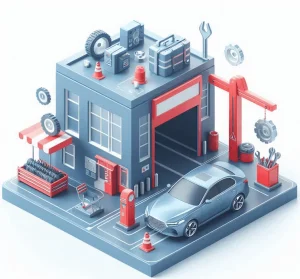Table of Contents
Ford Autonomous Vehicle In an era where technology is transforming every facet of our lives, the automotive industry is no exception. Among the pioneers driving this change, Ford stands out with its groundbreaking advancements in autonomous vehicle technology. The Ford Autonomous Vehicle revolution is reshaping the way we perceive mobility, promising a future where driving is not just a necessity but a seamless, enjoyable, and efficient experience.

The Genesis of Ford’s Autonomous Ambition
Ford’s journey into the realm of autonomous vehicles is a testament to its commitment to innovation and excellence. The company’s vision is to create a world where vehicles are not only smart but also capable of making driving safer, more efficient, and more accessible to everyone. The development of Ford Autonomous Vehicle technology is rooted in this vision, driven by a desire to push the boundaries of what is possible.
Early Innovations and Strategic Partnerships
Ford’s foray into autonomous technology began with the integration of advanced driver-assistance systems (ADAS). These systems, including adaptive cruise control, lane-keeping assist, and automated parking, laid the foundation for more advanced autonomous features. Recognizing the potential of these technologies, Ford embarked on strategic partnerships with tech giants like Argo AI, leveraging their expertise in artificial intelligence and machine learning to accelerate the development of Ford Autonomous Vehicle systems.
The Role of Argo AI
Argo AI has been instrumental in the evolution of Ford Autonomous Vehicle technology. This collaboration has enabled Ford to harness cutting-edge AI and robotics, creating a robust platform for autonomous driving. The partnership focuses on developing high-definition maps, sophisticated sensor systems, and powerful computing capabilities that are essential for safe and reliable autonomous vehicles.
Core Technologies Driving Ford Autonomous Vehicles
The sophistication of Ford Autonomous Vehicle technology is underpinned by a suite of advanced technologies that work harmoniously to deliver a seamless and safe autonomous driving experience. These include state-of-the-art sensors, artificial intelligence, machine learning, and high-definition mapping.
Advanced Sensor Suite
The backbone of Ford Autonomous Vehicle technology is its comprehensive sensor suite, which includes LIDAR, radar, cameras, and ultrasonic sensors. These sensors provide a 360-degree view of the vehicle’s surroundings, enabling it to detect and respond to obstacles, pedestrians, and other vehicles with pinpoint accuracy. By integrating data from multiple sensors, the vehicle can create a detailed and reliable perception of its environment.
Artificial Intelligence and Machine Learning
Artificial intelligence (AI) and machine learning are critical components of Ford Autonomous Vehicle technology. AI algorithms analyze vast amounts of data from the vehicle’s sensors, allowing it to make real-time decisions and adapt to changing conditions. Machine learning enables the system to learn from each driving experience, continuously improving its performance and safety.
High-Definition Mapping and Localization
Accurate localization is essential for autonomous driving, and Ford achieves this through high-definition mapping. These maps provide precise information about road geometry, traffic signals, and other critical features. By combining high-definition maps with real-time sensor data, Ford Autonomous Vehicle technology can navigate complex environments with remarkable accuracy and reliability.
Redundant Systems and Safety Protocols
Safety is paramount in the development of Ford Autonomous Vehicle technology. The vehicles are equipped with multiple redundant systems to ensure reliability in all situations. This includes backup sensors, redundant computing systems, and fail-safe mechanisms that can take over in the event of a system failure. Rigorous testing and validation processes further ensure that Ford’s autonomous vehicles meet the highest safety standards.
The Impact of Ford Autonomous Vehicles on Urban Mobility
The deployment of Ford Autonomous Vehicle technology extends beyond personal transportation, offering significant benefits across various sectors. From urban mobility solutions to commercial applications, Ford’s autonomous vehicles are poised to make a substantial impact.
Revolutionizing Ride-Sharing and Public Transport
In urban environments, Ford Autonomous Vehicle technology can revolutionize the way people move. Autonomous ride-sharing services can reduce the need for private car ownership, alleviating traffic congestion and lowering emissions. By providing efficient and reliable transportation options, Ford can contribute to more sustainable and livable cities.
Enhancing Logistics and Delivery Services
The commercial sector stands to gain significantly from Ford Autonomous Vehicle technology. Autonomous delivery vehicles can optimize logistics operations, reducing costs and improving efficiency. These vehicles can operate around the clock, ensuring timely deliveries and minimizing the reliance on human drivers. The integration of autonomous technology into commercial fleets can streamline supply chains and enhance overall productivity.
Improving Safety and Efficiency on Highways
Ford Autonomous Vehicle technology is well-suited for long-distance travel, offering enhanced safety and comfort on extended journeys. Autonomous driving technology can manage highway driving with precision, maintaining optimal speed and distance from other vehicles. This not only reduces driver fatigue but also improves overall road safety, making long trips more enjoyable and less stressful.
Ford’s Commitment to Sustainability and Innovation
Sustainability is a key pillar of Ford’s strategy, and Ford Autonomous Vehicle technology aligns with the company’s broader goals of creating a greener future. By integrating electric powertrains and optimizing energy efficiency, Ford is paving the way for environmentally friendly autonomous vehicles.
Electric and Hybrid Powertrains
Many Ford Autonomous Vehicle models are equipped with electric or hybrid powertrains, significantly reducing their environmental impact. Electric vehicles produce zero tailpipe emissions, contributing to cleaner air and reduced greenhouse gas emissions. Hybrid models combine the benefits of electric and internal combustion engines, offering improved fuel efficiency and lower emissions.
Energy-Efficient Driving
Autonomous driving technology can optimize energy consumption by adopting efficient driving patterns. Ford Autonomous Vehicle systems can maintain consistent speeds, avoid unnecessary acceleration and braking, and optimize route planning to minimize energy use. These energy-efficient driving practices contribute to reduced fuel consumption and lower emissions, supporting Ford’s sustainability objectives.
Sustainable Materials and Manufacturing
In addition to promoting energy efficiency, Ford is committed to using sustainable materials and manufacturing processes. The interiors of Ford Autonomous Vehicle models feature eco-friendly materials, such as recycled fabrics and sustainably sourced wood. The company also employs energy-efficient manufacturing practices, reducing the environmental footprint of its production facilities.
The Road Ahead: Future Prospects of Ford Autonomous Vehicles
As Ford continues to innovate and refine its autonomous driving technology, the future of Ford Autonomous Vehicle systems looks incredibly promising. The company’s ongoing commitment to research and development ensures that its autonomous vehicles will remain at the cutting edge of technology, offering even greater capabilities and benefits in the years to come.
Advancements in AI and Machine Learning
Future iterations of Ford Autonomous Vehicle technology will benefit from advancements in artificial intelligence and machine learning. These technologies will enable even more sophisticated decision-making, improving the vehicle’s ability to navigate complex environments and respond to unexpected situations. Continuous learning algorithms will ensure that the system evolves and adapts, maintaining the highest levels of safety and performance.
Expansion of Autonomous Capabilities
Ford is committed to expanding the autonomous capabilities of its vehicles, moving towards higher levels of autonomy. While current systems represent Level 3 autonomy, future models will aim for Level 4 and beyond, where vehicles can handle all aspects of driving without human intervention. These advancements will bring us closer to a future where fully autonomous vehicles are a common sight on our roads.
Integration with Smart Cities
The future of Ford Autonomous Vehicle technology is closely linked with the development of smart cities. Autonomous vehicles will play a crucial role in creating intelligent transportation systems that enhance urban mobility and reduce congestion. By integrating with smart city infrastructure, Ford Autonomous Vehicle systems can communicate with traffic signals, other vehicles, and central control systems to optimize traffic flow and improve overall efficiency.
Personalized Mobility Solutions
Ford envisions a future where autonomous vehicles offer highly personalized mobility solutions. Ford Autonomous Vehicle technology will be able to adapt to individual preferences, offering tailored driving experiences that cater to the unique needs of each passenger. From personalized entertainment options to customized climate control, these vehicles will provide a level of comfort and convenience that is unmatched.
The Human Element: Ensuring a Smooth Transition
While the technology behind Ford Autonomous Vehicle systems is undeniably impressive, ensuring a smooth transition to widespread adoption requires addressing several human factors. This includes public perception, regulatory frameworks, and ethical considerations.
Building Public Trust and Acceptance
Gaining public trust is essential for the successful deployment of Ford Autonomous Vehicle technology. Ford is committed to transparent communication and public education, highlighting the safety, efficiency, and environmental benefits of autonomous vehicles. By addressing concerns and showcasing the real-world advantages of autonomous technology, Ford aims to build widespread acceptance and enthusiasm.
Navigating Regulatory Challenges
The regulatory landscape for autonomous vehicles is complex and evolving. Ford is actively engaged with policymakers and regulatory bodies to shape a framework that ensures the safe and effective deployment of Ford Autonomous Vehicle systems. This includes developing standards for testing, data privacy, and cybersecurity to protect both passengers and the public.
Addressing Ethical Considerations
Autonomous driving raises important ethical questions, particularly in scenarios where the vehicle must make split-second decisions. Ford is committed to addressing these considerations through rigorous ethical guidelines and transparent decision-making processes. By prioritizing safety and fairness, Ford aims to develop Ford Autonomous Vehicle technology that aligns with societal values and expectations.
Ford Autonomous Vehicle
The Ford Autonomous Vehicle revolution represents a transformative shift in the automotive industry, combining cutting-edge technology with a commitment to safety, efficiency, and sustainability. As Ford continues to innovate and refine its autonomous driving systems, the benefits of this technology will become increasingly evident across various sectors.
From enhancing urban mobility and revolutionizing logistics to improving highway safety and reducing environmental impact, Ford Autonomous Vehicle technology is poised to make a lasting impact on the way we travel. With its unwavering dedication to excellence and a clear vision for the future, Ford is leading the charge towards a new era of autonomous mobility.
The road ahead is filled with exciting possibilities, and Ford Autonomous Vehicle technology is at the forefront of this journey. By embracing the future of autonomous driving, Ford is not only redefining the driving






More Stories
The Best Autonomous Cars of the Year
Volvo Self Driving Cars: When Safety Meets Autonomy
Luxury Meets Autonomy: Mercedes Self Driving Technology